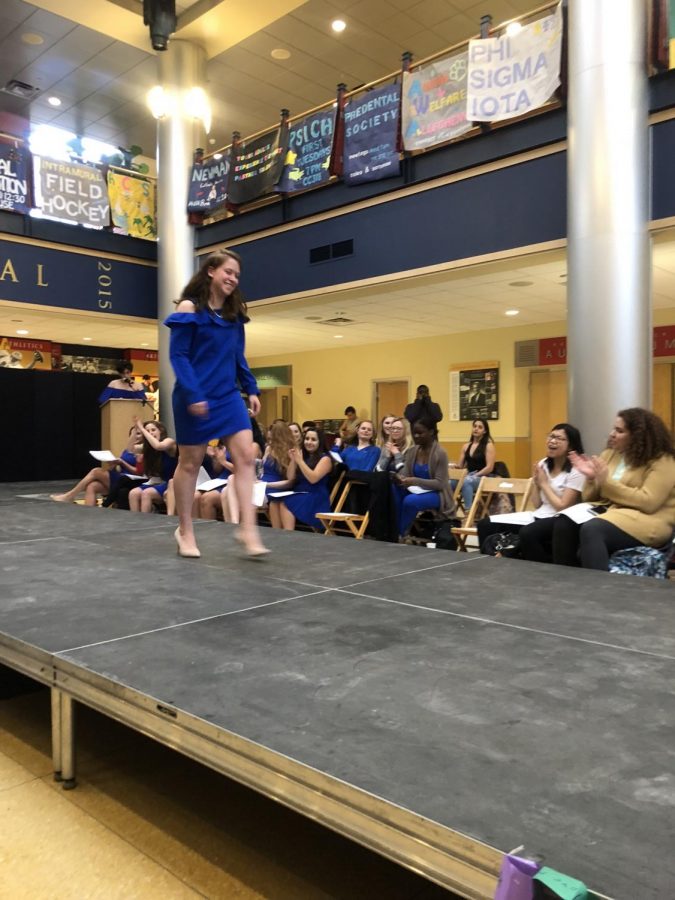Tri Delta strives to celebrate positive body perceptions
Catwalk to end Fat Talk encourages trashing negative body image
A crowd watched as participants walk in the Catwalk to end Fat Talk on Friday, April 6, 2018 in the Henderson Campus Center.
Allegheny College’s chapter of Delta Delta Delta held its second “Catwalk to end Fat Talk” on Friday, April 6 in the Henderson Campus Center lobby. The event featured over 30 participants with multiple speakers and raised $215.15 that was donated to the National Eating Disorder Association.
Fat talk refers to the “negative body-related conversations that often take place between friends,” according to the NEDIC helpline. It is highly individualized, as people who participate in fat talk typically focus on particular parts of their bodies they want to change through dieting or restricting food intake.
Former Body Image Coordinator and current Vice President of Chapter Development of Tri Delta Madi Heeter, ’20, explained the steps taken in recent years to improve issues surrounding body image, emphasizing a “healthy mind, body and spirit.”
“In Tri Delta, we have a speaker come to every single class year, so every new class that comes into Tri Delta have a retreat they have to go through,” Heeter said. “It educates you more on what body image is, and what 3D body image is. It discusses what a healthy mind, body and spirit looks like, and it gives you time to reflect on your own mind, body and spirit.”
Catwalk to end Fat Talk is an example of how Tri Delta has tried to stress the importance of body positivity outside of Tri Delta, according to Heeter.
This year, the Catwalk to end Fat Talk was organized by the current Body Image Coordinator of Tri Delta Hannah Kitchen, ’20, who opened the event with Simon Brown, ’19.
“To live a happier and healthier lifestyle, this past week the members of Tri Delta have been having a series of events to help build a healthy mind, body and spirit,” Kitchen said. “That’s how we got to today … This event is to show that you get to decide what you feel most comfortable in, and you get to show people that it’s okay to love yourself.”
Thirty-seven students exhibited a wide variety of outfits, from dresses and skirts to athletic or sleep wear of all different colors and styles.
David Heiner, ’20, strolled in his “favorite tank top and shorts” that he works out in, because he has received comments about how they were too short, according to the Catwalk to end Fat Talk program. Later that evening, David Roach, ’21, wore a blue dress with a pair of heels “to represent that being confident in your own skin always gives you that little boost to give you a pep in your step.”
Soon after the event started, Kalena Grimes, ’19, gave a keynote address about her own personal struggles with body image throughout her high school years.
“When I was in ninth grade, I was attending a performing arts high school,” Grimes said. “I would spend hours and hours in front of a mirror whether I was in class, which was three hours a day dancing, or at rehearsal which went about five hours and if I wasn’t at rehearsals, I was at my dance studio.”
Grimes was heavily involved in ballet and said it was common for dancers to be underweight.
“Somebody who’s five-foot six-inches is usually about 95 pounds,” Grimes said. “Everybody around me told me I was skinny, but I just didn’t have that same opinion; I just didn’t see it.”
This negative perception of her body led her to develop an eating disorder, according to Grimes. She stressed the importance of “taking those negative thoughts and throwing them out in order to create space for positive ones.”
Dakotah Manson, ’18, spoke about a personal experience later in the event, followed by Taylor Marzouca, ’21, who read a poem about body image, according to Heeter.
Holding the Catwalk to end Fat Talk is a way for Tri Delta to take a stand against negative perceptions of one’s body, according to Heeter. They hope to continue this event in the future, as discussions about body image are becoming more prevalent in the sorority.
“Within our sorority, ever since we’ve taken in new members, we’ve had so many girls open up about their experiences with themselves and their bodies and mental health and their eating disorders,” Heeter said.
Catwalk to end Fat Talk concluded Tri Delta’s Fat Talk Free Week, which featured a series of smaller events including a study day, body painting and others to promote a healthy body image, according to Heeter. While promoting body image 3D has only recently become their secondary philanthropy, many members of the sorority are working to expand it at Allegheny.
“It’s really new; I went to a conference in mid-February,” Heeter said. “I actually learned that a lot of chapters haven’t necessarily done a lot with the secondary philanthropy, so I think it’s really important for us as a small campus to use it to the best of it’s ability.”
Despite how new their secondary philanthropy is, Heeter said her and other sisters of Tri Delta are passionte about working to improve body image for students and community members.








